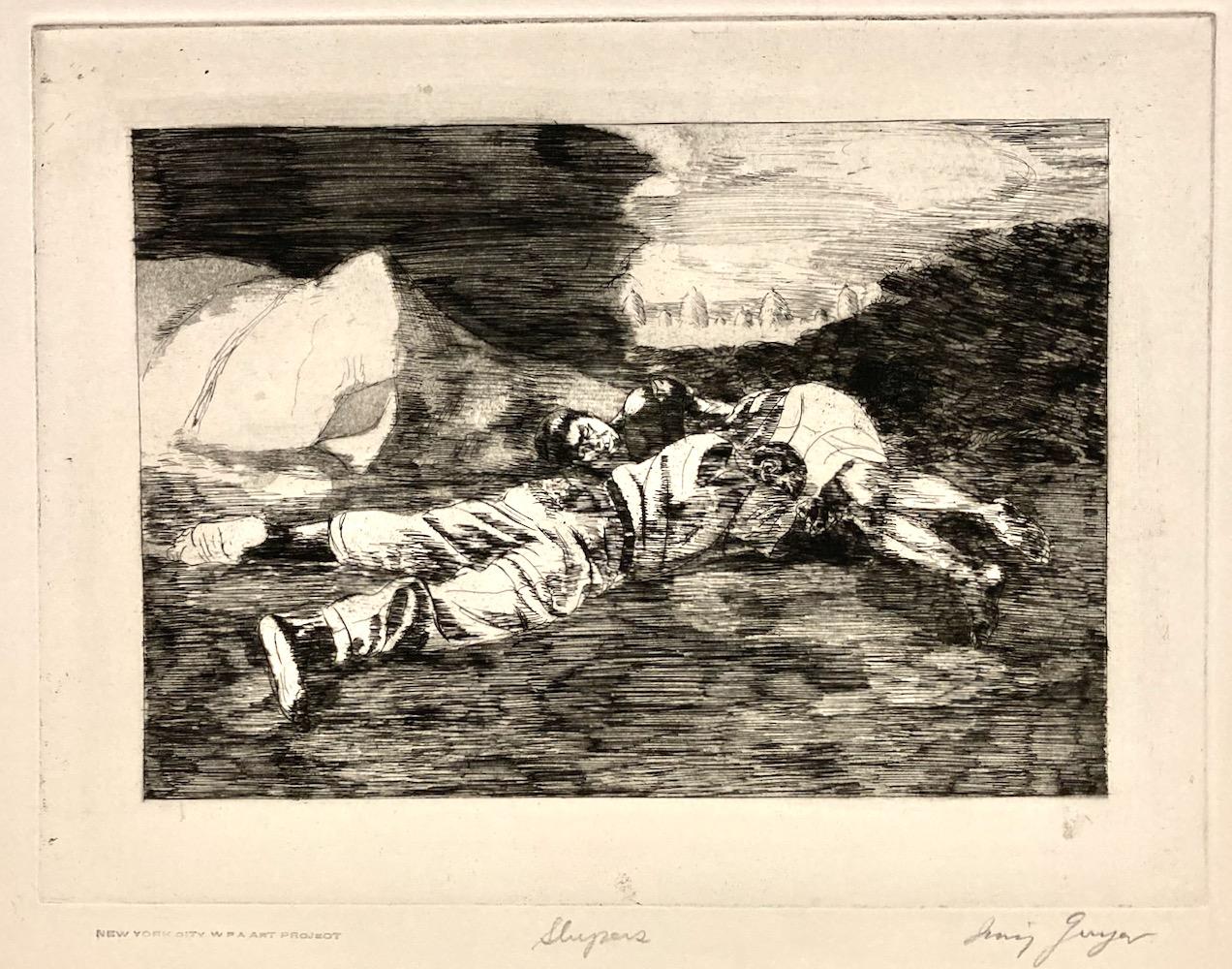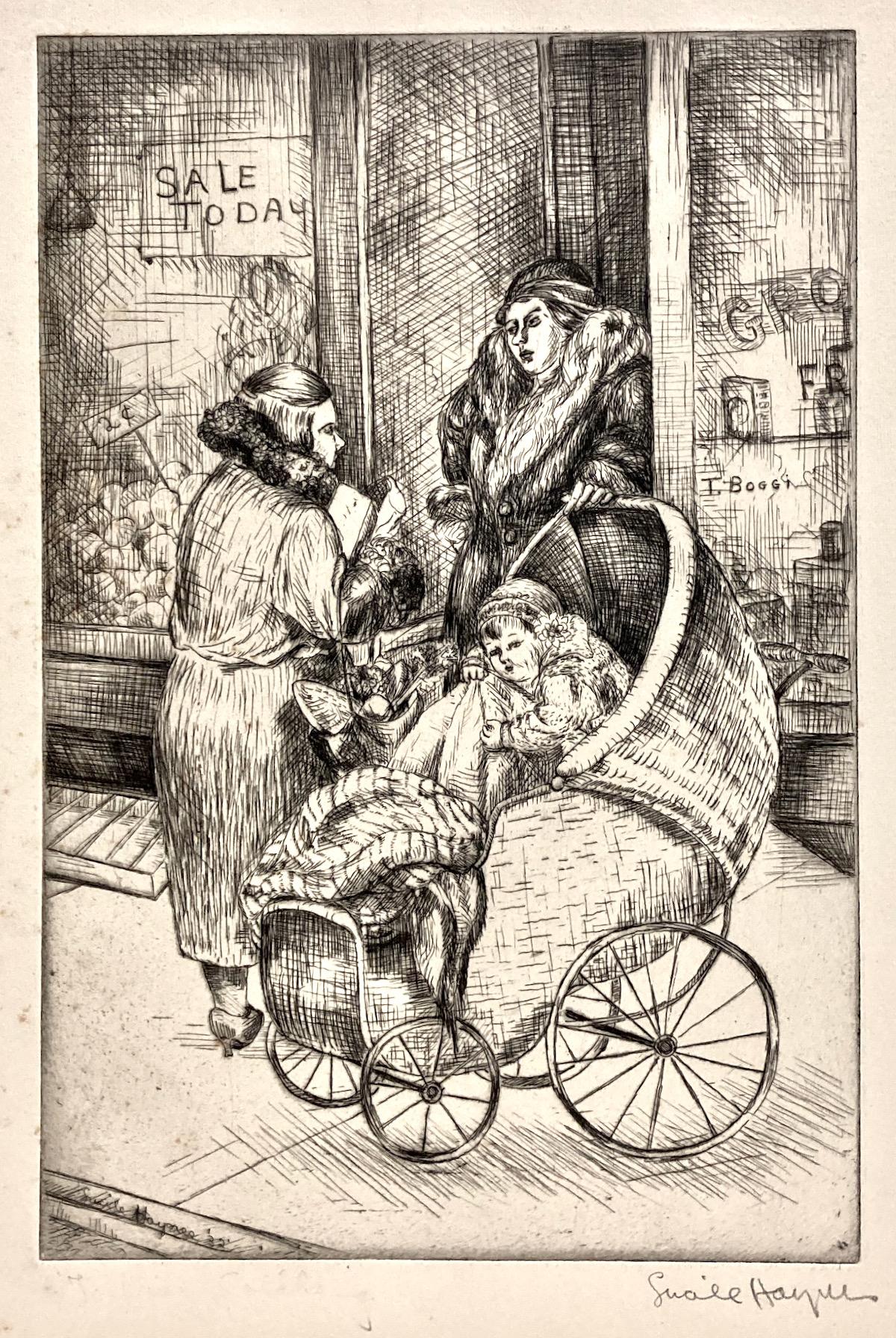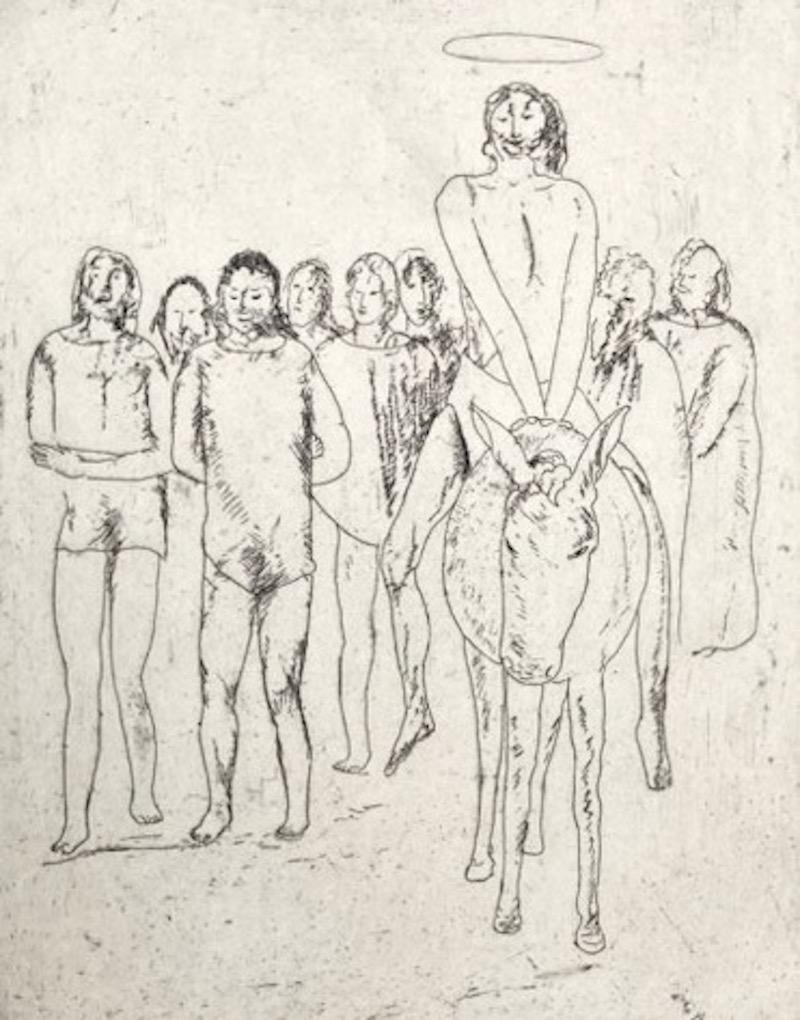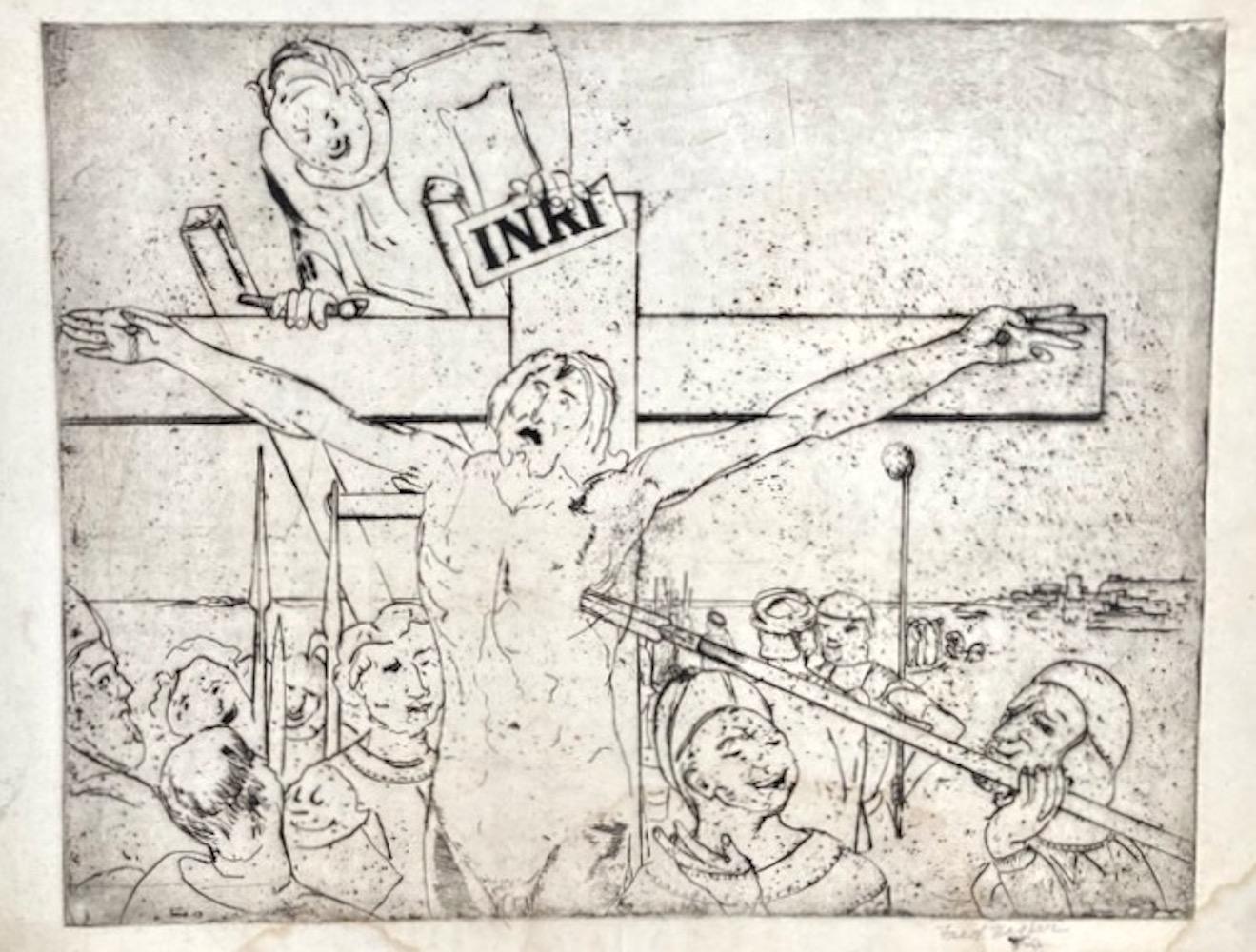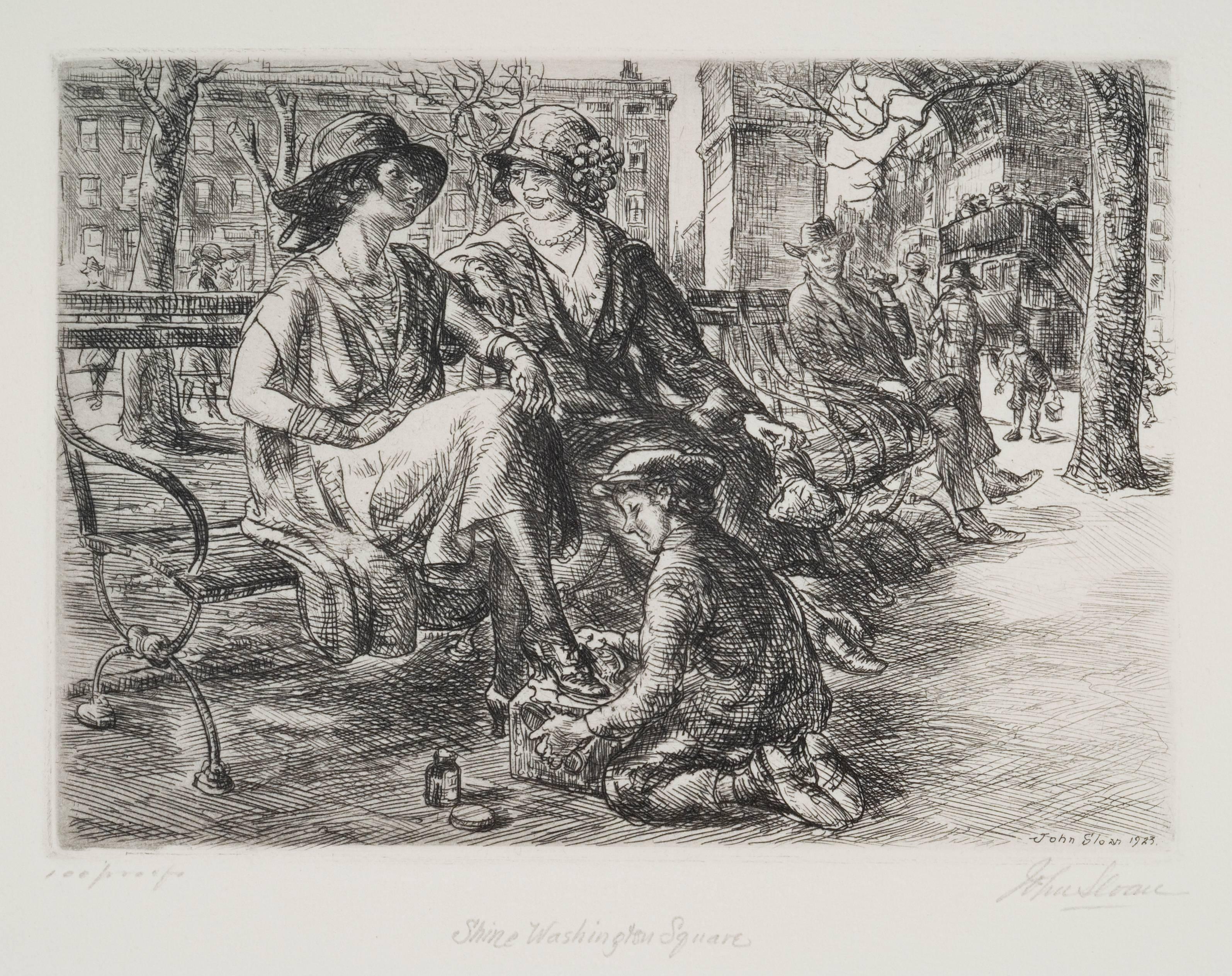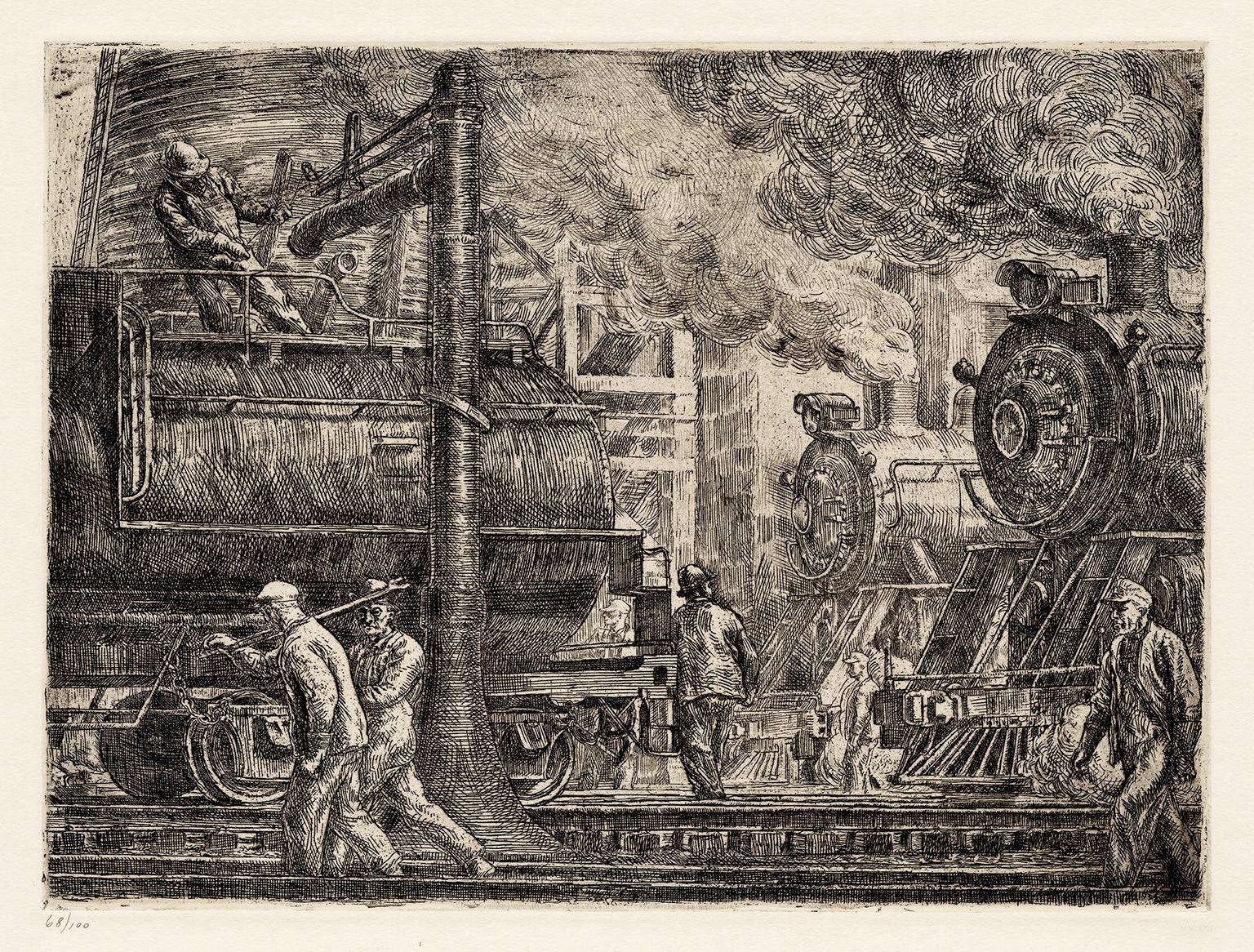Items Similar to New Year’s Eve and Adam
Want more images or videos?
Request additional images or videos from the seller
1 of 3
John SloanNew Year’s Eve and Adam1918
1918
About the Item
John Sloan, 'New Year's Eve and Adam', etching, 1918, edition 100, (only 85 printed), Morse 190. Signed, titled and annotated '100 proofs' in pencil. Signed and dated in the plate, lower left. A superb impression, on antique, cream laid paper, with full margins (1 5/8 to 2 3/8 inches), in excellent condition. Printed by Ernest Roth. Matted to museum standards, unframed.
Sloan used this print as a greeting for New Year’s 1919. "With some exaggeration, this records an incident of the holiday season in a New York Hotel, the Brevoort –J.S."
Impressions of this work are in the collections of the following musuem collections: Library of Congress, Metropolitan Museum of Art, Philadelphia Museum of Art.
ABOUT THE ARTIST
Dubbed the “dean of American artists,” John Sloan was one of the most influential members of the Ashcan School. Born in 1871 in Lock Haven, PA, he lived and worked in Philadelphia for most of his early career. Self-taught in etching, he enrolled at the Pennsylvania Academy of Fine Arts between 1892-1894, where he studied under Thomas Anshutz. Sloan began his career in commercial illustration in 1892 working for the Philadelphia Inquirer; later moving to the art department at the Philadelphia Press. A member of the ‘Philadelphia Five’, he frequently met with William Glackens, George Luks, Everett Shinn, and Robert Henri at Henri's studio. Henri had a profound influence on Sloan and encouraged him to pursue a fine art career.
Sloan moved to New York City in 1904, then the nation’s cultural and intellectual center and the home of a flourishing art scene. He quickly came to love New York and described it as the “gayest of cities, the cosmopolitan palette where the spectrum changed in every side of the street.” Sloan’s subjects, as diverse and varied as the city itself, celebrated the lives of ordinary Americans in a way that was unprecedented in American art. He painted and etched New York’s great avenues and landmarks, the tenements of the Lower East Side, the sweeping vistas of the Manhattan skyline, the crowd of working-class men at McSorley’s Bar, the audience in the moving picture house, the election night festivities in Herald Square, and the trio of women drying their hair on a Sunday morning. Sloan’s images of New York provided a sprawling and comprehensive pictorial testament to urban life and culture. His student, Guy Péne du Bois aptly described him as the “historian of Sixth Avenue, Fourteenth Street, Union Square, and Madison Square.” Sloan was keenly aware of New York’s rapidly changing environment and acknowledged that “the fun of being a New York painter is that landmarks are torn down so rapidly that your canvases become historical records before the paint on them is dry.”
Sloan’s works are particularly distinctive in the Ashcan genre due to his strong political commitments. In 1910, he joined the Socialist Party and in 1912 began creating illustrations for the popular socialist magazine ‘The Masses’. In spite of great economic prosperity, New York also presented the Ashcan artists with glaring inequalities between the classes. The city itself was physically divided by neighborhoods of grand mansions juxtaposed to poor immigrant communities and dilapidated slums. Sloan was undoubtedly influenced by the socially conscious art of the Mexican muralists Diego Rivera, David Alfaro Siqueiros, and José Clemente Orozco. Though he never espoused propaganda, his socialist beliefs resonate in his urban scenes and deeply sympathetic treatment of lower-class subjects.
An esteemed art instructor, Sloan had a profound influence on his students. Beginning in 1914, he taught at the Art Students League and later at the George Luks School of Art. After his death, the art critic Edward Allan Jewel wrote: “He is the artist’s guide, philosopher and friend. He is himself the artist through and through. And he brings to the profession of teaching a fervor so intense that it may be described as mystical. There are, to be sure, many liberal and independent minds. There are many artists, many teachers. There is only one John Sloan.”
John Sloan left a lasting mark on 20th-century American art and an important legacy for succeeding generations of American artists. After his death, Life Magazine asserted that no living man had a greater influence in the American Art world. His works memorialize a vibrant era of New York’s history and continue to be collected by every major museum including, Metropolitan Museum of Art, Whitney Museum of American Art, Brooklyn Museum, National Gallery of Art, Smithsonian Museum of American Art.
- Creator:John Sloan (1832-1932, American)
- Creation Year:1918
- Dimensions:Height: 3.75 in (9.53 cm)Width: 2.75 in (6.99 cm)Depth: 0.01 in (0.26 mm)
- Medium:
- Movement & Style:
- Period:
- Condition:
- Gallery Location:Myrtle Beach, SC
- Reference Number:
John Sloan
John Sloancame to New York in 1904 and worked for some time as a freelance illustrator. With Robert Henri, he organized an exhibition of a group of urban realist painters, known as "The Eight" or the "Ashcan School," who challenged traditional notions of art. Having moved to the Village in 1912, Sloan lived with his wife Dolly at 240 West 4th Street and at 88 Washington Place.
About the Seller
5.0
Recognized Seller
These prestigious sellers are industry leaders and represent the highest echelon for item quality and design.
Platinum Seller
These expertly vetted sellers are 1stDibs' most experienced sellers and are rated highest by our customers.
Established in 1995
1stDibs seller since 2016
259 sales on 1stDibs
Typical response time: 1 hour
Associations
International Fine Print Dealers Association
- ShippingRetrieving quote...Ships From: Myrtle Beach, SC
- Return PolicyA return for this item may be initiated within 7 days of delivery.
More From This SellerView All
- 'Locomotives Watering' — 1930s Social RealismBy Reginald MarshLocated in Myrtle Beach, SCReginald Marsh, 'Erie R.R. Locos Watering (Locomotives Watering)', etching, 1934, edition 100 (Whitney, 1969), Sasowsky 155. Unsigned as published; numbered '68/100' in pencil. A su...Category
1930s Ashcan School Figurative Prints
MaterialsEtching
- 'A Morning in May' — 1930s Social Realism, New York CityBy Reginald MarshLocated in Myrtle Beach, SCReginald Marsh, 'A Morning in May', etching, 1936, edition 100 (Whitney, 1969), Sasowsky 169. Unsigned as published; numbered '89/100' in pencil. A superb, richly-inked impression, ...Category
1930s Ashcan School Figurative Prints
MaterialsEtching
- The Sixth Avenue Spur, New York City — 1920s American ExpressionismBy Frederick K. DetwillerLocated in Myrtle Beach, SCFrederick K. Detwiller, 'The Sixth Avenue Spur, New York City', lithograph, 1924, edition 20. Signed, dated, titled, and annotated 'Lith 20' in pencil. Inscribed 'To my Friend Herbert L. Jones' in pencil. Signed and dated, in the stone, lower right; initialed and dated '1927' in the stone, lower left. A fine, richly-inked impression, on cream wove paper, with margins (7/8 to 1 1/4 inches); slight toning in the top left sheet edge, otherwise in good condition. Scarce. Image size 20 1/2 x 14 inches (521 x 356 mm); sheet size 22 1/2 x 16 inches (572 x 406 mm). Archivally matted to museum standards, unframed. ABOUT THE IMAGE The Sixth Avenue El was constructed in the late 1870s by the Gilbert Elevated Railway and reorganized as the Metropolitan Elevated Railway. By 1878, it was running from Rector Street to 58th Street. Soon after that, it was taken over by the Manhattan Railway Company, with three other Manhattan elevated train lines. The company built a connection, the ‘spur’ by which it turned west on 53rd Street to merge with the 9th Avenue El—paralleling the present-day route of the 6th Avenue subway. The Sixth Avenue El served the “Ladies Mile” shops (including the Siegel-Cooper emporium, whose building now houses Bed...Category
1920s Ashcan School Figurative Prints
MaterialsLithograph
- 'Hurdy Gurdy Ballet' — 1920s New York — American SceneBy Glenn O. ColemanLocated in Myrtle Beach, SCGlenn O. Coleman, 'Hurdy Gurdy Ballet', lithograph 1928, edition 50. Signed, dated, and numbered '14/50' in pencil. Titled in the bottom left margin, in a...Category
1920s Ashcan School Figurative Prints
MaterialsLithograph
- Erinnerung (Remembrance) — Turn-of-the Century Romantic EtchingBy Max KlingerLocated in Myrtle Beach, SCMax Klinger, 'Erinnerung (Remembrance)', etching and aquatint, 1896. A fine, richly inked impression, on off white, wove paper, with full margins (1 3/4 to 3 1/8 inches), in excellen...Category
1890s Post-Impressionist Figurative Prints
MaterialsAquatint, Etching
- 'Grand Central Station' — 1920s New York CityBy Otto KuhlerLocated in Myrtle Beach, SCOtto Kuhler, 'Grand Central Station', etching and drypoint, 1927, edition c. 50, Kennedy 27. Signed and titled in pencil. A superb, richly-inked impression, in brown/black ink, with ...Category
1920s American Impressionist Figurative Prints
MaterialsDrypoint, Etching
You May Also Like
- Irving Guyer, SleepersBy Irving GuyerLocated in New York, NYClassic American Depression-Era subject meets the French landscape? Clearly the Guyer was looking at both Jean-Francois Millet and Vincent Van Gogh, who together informed this image....Category
1930s Ashcan School Figurative Prints
MaterialsEtching
- Lucile Haynes, (Two Women with Child in Baby Carriage)Located in New York, NYIt's clear to me that that baby carriage is so beautifully drawn that it could be re-constructed from here if necessary. Without really knowing anything about Lucile Haynes I'm sure...Category
1930s Ashcan School Figurative Prints
MaterialsEtching
- Fred Nagler, (Road to Calvary)By Fred NaglerLocated in New York, NYThe etching (Road to Calvary) is signed in pencil. It's in an usually spare drawing style but one that Nagler did use occasionally. Here it emphasizes the meagerness of the scene. T...Category
1920s Ashcan School Figurative Prints
MaterialsEtching
- Fred Nagler, (Crucifixion)By Fred NaglerLocated in New York, NYThe etching (Crucifixion) is signed and titled in pencil. Signed 'Fred' and possibly dated '27' in the image at lower left. It's in an usually spare drawing style but one that Nagl...Category
1920s Ashcan School Figurative Prints
MaterialsEtching
- SHINE, WASHINGTON SQUAREBy John SloanLocated in Portland, MESloan, John. SHINE, WASHINGTON SQUARE. Morse 206. Etching, 1923. Signed, titled and inscribed "100 proofs," and further inscribed "Peter Platt imp." Morse says that 80 were print...Category
1920s Ashcan School Figurative Prints
MaterialsEtching
- Fred Nagler, (Sheep under a Tree)By Fred NaglerLocated in New York, NYThe etching (Sheep under a Tree) is signed in pencil and annotated (in lower margin) '3rd State, 4 proofs, JN imp.' in pencil. It's in an usually spare drawing style but one that Na...Category
1920s Ashcan School Figurative Prints
MaterialsEtching
